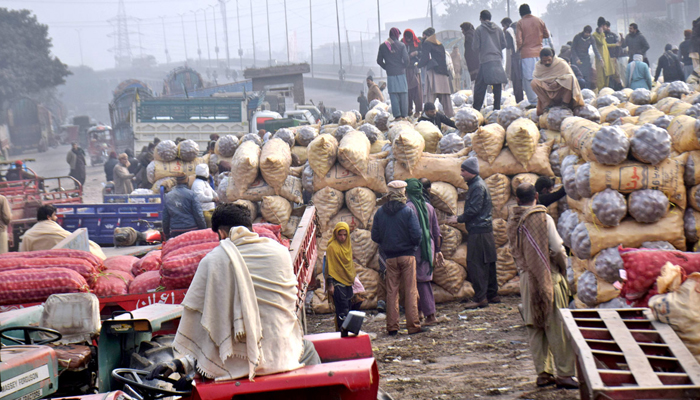SPI falls below 40pc for first time in 11 weeks
PBS data showed that prices of 12 items saw increase, 17 witnessed decrease, 22 remained unchanged during week
ISLAMABAD: The weekly inflation eased slightly to 39.45 percent in the week ending February 1, after staying above 40 percent for 11 consecutive weeks, official data showed on Friday, as prices of some food items declined.
The Sensitive Price Index (SPI), which tracks the prices of 51 essential items in 17 urban centres, fell 0.28 percent from the previous week, according to the Pakistan Bureau of Statistics (PBS). The SPI increased by 39.45 percent year-on-year.
Notably, prices of tomatoes, potatoes, onions, and eggs registered a decrease.
The PBS data showed that prices of 12 items saw an increase, 17 witnessed a decrease, and 22 remained unchanged during the week.
As per the inflation bulletin, for individuals in the lowest income slab, earning up to Rs17,732 per month, the SPI inflation stood at 32.8 percent, while for those in the group spending more than Rs44,175 per month, it was recorded at 37.33 percent. For the middle quintile (Rs22,889 to Rs29,517), the weekly inflation was at 43.58 percent— the highest among all groups.
During the week, notable reductions were observed in the prices of tomatoes (18.3 percent to Rs108/kg), Eggs (7.8 percent to Rs393/dozen), onions (7percent to Rs210/kg), LPG 11.67Kg cylinder (1.53 percent to Rs3,341), tea Lipton 190 gm (1.3 percent to Rs551/packet), potatoes (1.25 percent to Rs54./kg), masoor pulse (0.80 percent to Rs337/kg), cooking oil 5 Litre (0.36 percent to Rs2,740) and mustard oil (0.28 percent to Rs501/kg), wheat flour 20kg bag (0.20 percent to Rs2,811).
Conversely, prices of petrol super increased by 5.2 percent to Rs274/liter, chicken farm broiler (live) by 1.88 percent to Rs469/kg, high-speed diesel by 0.95 percent to Rs280/liter, and bananas by 0.68 percent to 121/dozen, moong pulse 0.34 percent to Rs308/kg.
Further analysis of the data revealed significant year-on-year increases in the prices of certain items. Notable among these are gas charges for Q1 (1108.6 percent), cigarettes (92 percent), tomatoes (90 percent), chilies powder (81.7 percent), wheat flour (62 percent), gents’ sponge chappal (58 percent), sugar (55 percent), gents’ sandals (53 percent) and gur by 52 percent. Similarly, salt powder price increased by 41 percent, rice IRRI-6/9 by 39 percent and mash pulse was expensive by 37 percent over the same week of last year’s prices. Whereas, prices witnessed a decrease in onions (15 percent), mustard oil (11 percent), bananas (10 percent), vegetable ghee 1-KG (4 percent), and LPG 1.6 percent over the corresponding week of last year.
Pakistan is facing high inflation amid a sluggish economy, which contracted by 0.2 percent in the last fiscal year and is projected to grow by 2 percent in the current fiscal year, according to the International Monetary Fund (IMF). The central bank has kept its policy rate unchanged at record 22 percent since July 2023 to keep inflation expectations in check.
-
 Melissa Jon Hart Explains Rare Reason Behind Not Revisting Old Roles
Melissa Jon Hart Explains Rare Reason Behind Not Revisting Old Roles -
 Meghan Markle Eyeing On ‘Queen’ As Ultimate Goal
Meghan Markle Eyeing On ‘Queen’ As Ultimate Goal -
 Japan Elects Takaichi As First Woman Prime Minister After Sweeping Vote
Japan Elects Takaichi As First Woman Prime Minister After Sweeping Vote -
 Kate Middleton Insists She Would Never Undermine Queen Camilla
Kate Middleton Insists She Would Never Undermine Queen Camilla -
 King Charles 'terrified' Andrew's Scandal Will End His Reign
King Charles 'terrified' Andrew's Scandal Will End His Reign -
 Winter Olympics 2026: Lindsey Vonn’s Olympic Comeback Ends In Devastating Downhill Crash
Winter Olympics 2026: Lindsey Vonn’s Olympic Comeback Ends In Devastating Downhill Crash -
 Adrien Brody Opens Up About His Football Fandom Amid '2026 Super Bowl'
Adrien Brody Opens Up About His Football Fandom Amid '2026 Super Bowl' -
 Barbra Streisand's Obsession With Cloning Revealed
Barbra Streisand's Obsession With Cloning Revealed -
 What Did Olivia Colman Tell Her Husband About Her Gender?
What Did Olivia Colman Tell Her Husband About Her Gender? -
 'We Were Deceived': Noam Chomsky's Wife Regrets Epstein Association
'We Were Deceived': Noam Chomsky's Wife Regrets Epstein Association -
 Patriots' WAGs Slam Cardi B Amid Plans For Super Bowl Party: She Is 'attention-seeker'
Patriots' WAGs Slam Cardi B Amid Plans For Super Bowl Party: She Is 'attention-seeker' -
 Martha Stewart On Surviving Rigorous Times Amid Upcoming Memoir Release
Martha Stewart On Surviving Rigorous Times Amid Upcoming Memoir Release -
 Prince Harry Seen As Crucial To Monarchy’s Future Amid Andrew, Fergie Scandal
Prince Harry Seen As Crucial To Monarchy’s Future Amid Andrew, Fergie Scandal -
 Chris Robinson Spills The Beans On His, Kate Hudson's Son's Career Ambitions
Chris Robinson Spills The Beans On His, Kate Hudson's Son's Career Ambitions -
 18-month Old On Life-saving Medication Returned To ICE Detention
18-month Old On Life-saving Medication Returned To ICE Detention -
 Major Hollywood Stars Descend On 2026 Super Bowl's Exclusive Party
Major Hollywood Stars Descend On 2026 Super Bowl's Exclusive Party




